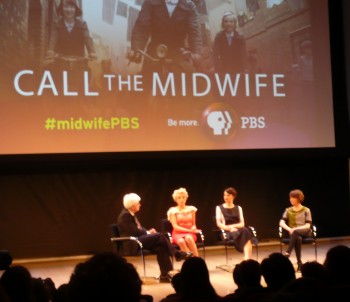Call the Midwife
By Nancy Kraus LM, CNM

I admit it, I am a “Call the Midwife” junkie. I have seen every episode since the series was first broadcast in the United States in 2011, read the original East End trilogy of books about life in post-war London in the 1950s by Jennifer Worth, own the first couple DVDs, arranged for NYSALM to advertise on PBS around our state during the second season, wrote some blog posts about various episodes for the NYSALM website, went to an event PBS sponsored in NYC with several of the cast members during the second season, and have made my husband watch every episode and Christmas special with me (I think he secretly enjoys it almost as much as I do.)
“Call the Midwife” has always had the most authentic birthing scenes, so unlike the typical American depictions of labor and birth. And the social issues they have addressed from racism and sexism, mental and physical disabilities and illnesses, prostitution, incest, alcoholism, extreme poverty, sexual and physical abuse, birth defects, love and death are always presented in a humane and compassionate way. In England, the series had the most viewers of any launch at BBC1.
So I was delighted when Terri Coates, the midwife who is the technical adviser to the show, was one of the last presenters at this year's ACNM Annual Meeting in Savannah, GA. Jennifer Worth wrote her memoir after reading an article Terri had written in the Royal College of Midwives Journal, lamenting that midwives were not accurately portrayed or often seen in literature and movies. Terri said in her article that she wished a midwife somewhere could do for midwives “what James Herriot did for vets.” (Herriot wrote the best-selling “All Creatures Great and Small” books about an English country veterinarian). Jennifer hand-wrote the manuscripts on various pieces of paper that were then put together to form the books.
Terri was delightful. She has been the technical advisor, on set during all filming, since the series began. She explained how real newborn babies are used in many of the scenes, and that she must ensure the safety of the babies during productions and ensure that all medical scenes are done authentically. They also use some very expensive, amazing prosthetics in the filming.
Next Spring, Season 8, which takes place in 1964, will premiere. I can’t wait to see how the midwives are changing with the times. A delightful rumor I heard is that Heidi Thomas, the executive producer of the series, might consider a similar series about the Frontier Nursing Service. Now wouldn’t that be fabulous!
Join Our Mailing List
Keep up to date with the latest news and announcements from NYC Midwives.
